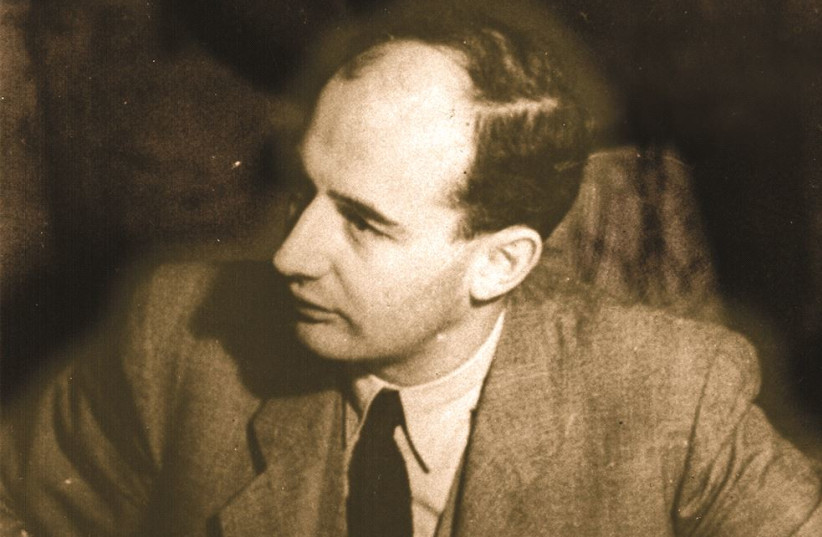
Raoul Wallenberg – another birthday with unanswered questions – opinion
Coinciding with the 109th anniversary of his birth (August 4, 1912), I would like to reflect on the awe-inspiring legacy of Raoul Wallenberg, one of the greatest heroes of the 20th century.
By BARUCH TENEMBAUM AUGUST 2, 2021 20:43

Raoul Wallenberg(photo credit: Wikimedia
lI was born in Argentina, into a traditional Jewish family and as such, I learned that one of the principal tenets of Judaism is hakarat hatov (recognizing the good).
Luckily enough, neither I nor my loved ones have suffered the plight of the Holocaust, but this tragic chapter has marked me for life.One of the lessons I have learned from history is that the “banality of evil” of the Nazis and their henchmen (a term coined by Hannah Arendt) was confronted by tens of thousands of women and men who opted not to stand idly by in the face of cruelty, oftentimes, putting their own lives, and that of their families, in mortal danger.
With this in my mind I founded the International Raoul Wallenberg Foundation, a global-reach NGO with a mission to preserve and spread the legacy of Raoul Wallenberg and of people like him who saved lives in the Holocaust, the Armenian genocide and other tragic chapters of history. Today, the foundation is led by my friend, Eduardo Eurnekian, who like me is Argentinean but a descendant of Armenian survivors.Coinciding with the 109th anniversary of his birth (August 4, 1912), I would like to reflect on the awe-inspiring legacy of Raoul Wallenberg, one of the greatest heroes of the 20th century. As a scion of one of the most powerful families in Sweden, he could have chosen a life of comfort and professional success. Instead, at the early age of 32, he plunged himself into a fateful mission which would end up saving the lives of tens of thousands of Hungarian Jews and would eventually lead him to his own personal tragedy.
As an official emissary of Sweden and the backing of the US War Refugee Board, he arrived in Budapest on July 9, 1944 and in 184 days, he succeeded in setting-up an impressively well-orchestrated rescue operation designed to save the lives of the remaining Jewish community in Hungary.
Thanks to his devotion, organizational skills, ingenuity and audacity, he managed to save around 100,000 innocent people from death. He did so through the establishment of safe houses (protected by the Swedish flag), and the design and distribution of Swedish Schutzpasses (devoid of any legal validity) that provided protection to their holders. He knew how to cajole key people in the Hungarian government and he wouldn’t hesitate to bribe or threat those officials who showed reluctance to cooperate with him.
Eyewitnesses accounts tell us than in several cases, he arrived in sites were Jews were rounded-up for deportation or immediate execution, demanding from the Nazis in charge to release them at once since “they were Swedish citizens.”By the end of 1944, Wallenberg understood that the war’s Hungarian front was nearing its end. Worried about the future of the Jewish refugees, he organized a meeting with Marshall Rodyon Malinovsky, commander of the Soviet forces, with the aim of negotiating this issue.Not heeding his colleagues’ advice, he instructed his loyal aide and chauffeur Vilmos Langfelder, to drive him to Debrecen, to the Soviet military headquarters.
His meeting with Marshal Malinovsky was to be held there on January 17, 1945.Instead of meeting with his high-ranking interlocutor, Wallenberg and his aide were arrested by the SMERSH (the Red Army Counterintelligence Unit) and transferred to Lubyanka prison in Moscow. At that point, traces of both men just faded from the face of the earth.Regrettably, the Swedish authorities and Raoul’s own powerful relatives seemingly did very little to extricate him from his captivity.
According to an article by Susanne Berger and Vadim Birstein published in The Jerusalem Post on April 17, 2020, it is believed that the Swedish government was more interested in striking a trade agreement with Stalin than releasing Raoul. Apparently, the Swedes feared that placing Wallenberg issue on the bilateral agenda might thwart the ongoing trade negotiations with the Soviets.As far as the influential Wallenberg family is concerned, it is worth noting that during WWII, their huge conglomerate had trade relations with both the Allies and the Nazis. At that time, the operations of the group were led by Marcus and Jacob Wallenberg (first cousins of Raoul’s deceased father).
The former dealt with the Allies and the latter with Germany, selling essential raw materials for its war machinery. In their book The Art of Cloaking Ownership, authors Gerard Aalders and Cies Wiebes claim that the Wallenberg family cooperated with German companies in an effort to evade sanctions after the war. The above mentioned issues might have influenced the family’s passive approach to Raoul’s captivity. I hope the Russian authorities will one day enable unfettered access to the relevant wartime archives, as they might shed light into the fate of Raoul Wallenberg.
To be sure, Russia of today should not be blamed for Stalin’s deeds but it could definitely help bringing closure to this tragedy.Raoul Wallenberg was one of the greatest humanitarians in the history of the world and if at all possible, his mortal remains should be brought back to Sweden so that he can rest in peace next to his closest relatives, in a befitting grave for a hero.The writer is founder of the International Raoul Wallenberg Foundation.
